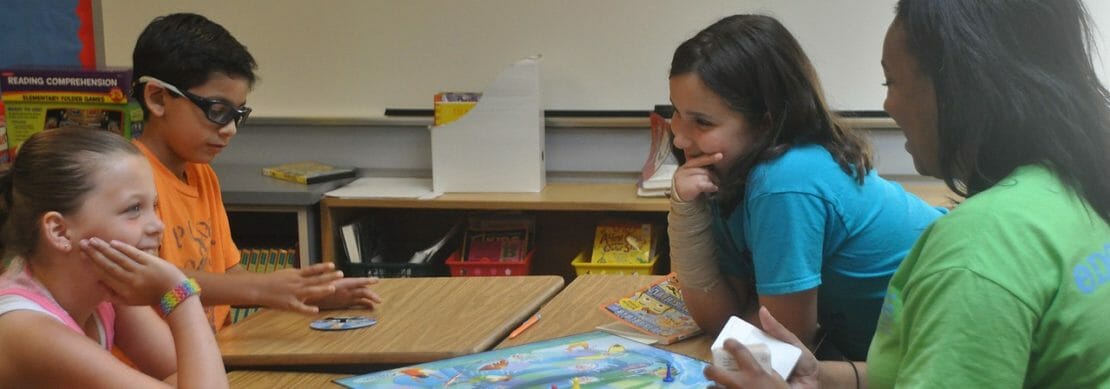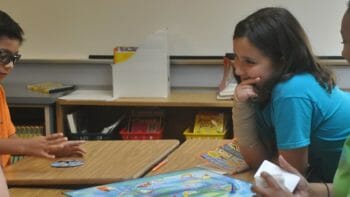Ensuring students feel good about themselves, the world around them, and developing healthy relationships with others, is vitally important for all children. Let’s dig into how summer day camps can provide children with support for developing and maintaining their social-emotional well being.
Connecting with Peers
Summer can be a lonely time for children who aren’t on long vacations, sleepaway camps, or out of town visiting friends and loved ones. The social groups they form during the school year tend to scatter in the summer as children go off on their own adventures. COVID-19 has further challenges of maintaining and creating new friendships. All of these hurdles disrupt a child’s sense of community and belonging, which can lead to regressions in their social-emotional growth.
One of the benefits summer camp provides is a social bridge between the academic school years. SummerEdge offers a wonderful opportunity for children to build new friendships. Camp can offer smaller group sizes while welcoming a diverse array of campers from a wider geographic area. When students get the opportunity to interact and socialize with other children who don’t know them from home or school, they often feel more comfortable being themselves and letting their guard down. This can lead to increased confidence and a belief that who they really are is enough for other kids to like and value them.
Building Healthy Relationships with Adults
Camps offer the opportunity for children to develop positive relationships with adults, another important component to social-emotional growth. There’s always a camper with first day jitters, or maybe even in tears upon arrival. Whether that’s due to camp being an unfamiliar environment, a fear of making new friends, or low confidence in academic abilities–a supportive adult can make all the difference in these situations.
Many of McLean School’s faculty, staff, and former students make up the talented team at SummerEdge. The instructors of McLean School are able to identify where a child is struggling, be it socially or academically. They offer comfort, teach the way each child learns best, provide strategies for children as they navigate social situations, and empower them to feel successful. Our counselors even join campers during lunch should help be needed to facilitate social interactions between children. It’s these positive interactions with adults that shape a child’s own relationship with others, their behavior, and improve self esteem. Research shows the deep impact on a child’s social well being when they have a positive relationship with an adult. In fact, one of the biggest predictors of college success is the development of healthy relationships with their teachers.
The Comfort of Structure
Mclean School provides structure to a child’s day from the time they arrive in the morning to afternoon dismissal. There is a plan, a schedule, a sense of predictability. When children are able to anticipate their routine it can provide them with a feeling of comfort, reducing the chances for confusion and anxiety throughout their day. Unfortunately, when school closes for summer break that crucial system abruptly ends for many children.
Day camps can restore that familiar, school-like routine to a child’s day with established procedures for arrival, allocated times for specific activities, and guidance from staff during transitions. Camps have the added benefit of extended time for recreation, breaks, and group activities. The rigors of school life are reduced even in academic summer camps as the focus becomes more on the fun of learning and group interaction rather than outcome in the form of grades or test scores.
When campers know that the end of the school year doesn’t mean an end to a routine, simply a shift, it can provide a great level of reassurance. The same campers who arrived anxious on their first day of camp leave with smiles and laughter on their last because camp felt like an old familiar friend.
Lasting Positive Feelings
When children reflect upon their time at summer camp, their most vibrant memories might not be about the intricacies of every project they worked on, the names of all of their fellow campers, or the scores of the games that they played. Those memories will inevitably fade. But what remains should be the positive feeling that camp invokes. When academic summer camps successfully provide social-emotional support to their campers, those feelings are of comfort, a sense of belonging, and happiness.




